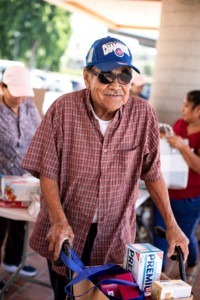Hunger in America
In collaboration with our national office, Feeding San Diego conducts a comprehensive hunger study, titled Hunger in America, every four years. The following data, from surveys of our partner agencies and clients, includes highlights from the full report.
Clients & Food Service
- 473,500 different people annually
- Food is provided to individuals 70,700 times in any given week
- 72% of clients plan to receive this food on a regular basis
Client Profile

Children

Families

Seniors

Post-Secondary Students

Veterans & Military Families
Demographics
- 26% of those served by surveyed programs* are under the age of 18, 10% are under 5
- 9.5% are over the age of 60
- 49% are Hispanic or Latino, 27% are White, 5% are Black or African American, and the rest are from other racial groups
- 15% of households have at least one veteran (previously served in the military)**
Employment & Income
Employment status was measured for the household member who was employed the greatest number of months in the past 12 months. This person is typically a primary source of income and, as such, their employment may profoundly affect the household’s ability to be self-sufficient.
- 64% of households include a member who has worked for pay in the last 12 months, 38% in the last four weeks
- Of individuals who worked most in a household, 27% worked over 40 hours per week
- 58% of households have a monthly income of less than $1,000
- 70% of households have incomes below 100% of the federal poverty level
Health
The health of an individual is directly connected to their access to nutrition. Poor health, illnesses and medical disorders can present a substantial financial challenge, which can create a cyclical struggle of choosing between paying for nutritious foods and medical care.
- 24% of households have a member in poor health
- 32% of households have a member with diabetes
- 40% of households lack health insurance of any kind (including Medicaid)
Living Situation
Housing circumstances are an important indicator of stability. However, even those with more stable arrangements may lack access to quality housing, measured by the ability to cook and store food at home.
- 78% of households are living in non-temporary housing, such as houses and apartments
- 20% of households do not have access to a stove, microwave or hot plate and 24% do not have access to refrigeration
Coping Strategies
Food Vs.
HousingTransportationMedicine
Making Tough Choices
- 53% choose between paying for food and medicine or medical care
- 54% choose between paying for food and utilities
- 39% choose between paying for food and housing
- 57% choose between paying for food and transportation
- 27% choose between paying for food and education
Stretching Dollars
- 49% eat food past its expiration date
- 45% sell or pawn personal property
- 67% purchase inexpensive, unhealthy food
- 35% water down food or drinks
- 18% grow food in a garden
Use of Other Food Assistance
Many clients also use government food assistance to supplement their household food budget and help make ends meet. Although the study does not collect all of the necessary information to assess eligibility, there is an indication that many more would be eligible to receive assistance.
- 28% of households are receiving Supplemental Nutrition Assistance Program (SNAP) benefits
- Of those not receiving SNAP benefits, 40% have never applied
- Of those receiving SNAP benefits, 67% run out of benefits in the first three weeks of the month
- 84% of households have children who participate in free or reduced-price school lunch programs
*Surveyed programs do not include programs which specifically serve children, including BackPack, School Pantry and Farm2Kids. HIA 2014 states, “We know that this figure…is an underestimate as programs that only serve children were excluded from eligibility for the Client Survey, and children at multi-age meal programs were not eligible to be samples for the survey and are thus not represented.”
**Military is defined as Army, Navy, Marine Corps, Air Force, Coast Guard and their Reserve Components.









